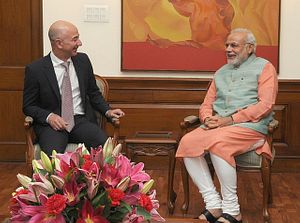There was plenty of optimism and euphoria after Prime Minister Narendra Modi visited the U.S. last week. The trip’s coverage in mainstream and social media in India was overwhelming. While the chants of Modi echoed in Madison Square Garden and on the streets of New York City, the real litmus test came in Washington D.C. While many concrete issues such as climate change and security discussed and agreed upon, there were also some unconventional approaches, such as the penning of a joint op-ed in the Washington Post by U.S. President Barack Obama and Modi; a first of its kind between the countries. This comes at a key time, when India has relaxed its visa rules by issuing 10-year visas for U.S. nationals, giving Person of Indian Origin (PIO) card holders lifelong-visas, and putting a system in place to allow visas on arrival for U.S. tourists.
Corporate India is now voicing key concerns on the Border Security, Economic Opportunity and Immigration Modernization Act of 2013, which was passed in the U.S. Senate but has yet to go through the House of Representatives, and the existing issues regarding the H-1B and L-1 visas. India Inc. in recent years, and especially its IT and ITES sectors, has been vocal about the problems facing Indian firms and their employees in getting a work permit to service clients on-site. There was considerable expectation that this would be a key area of discussion between Obama and Modi. Many stakeholders in India expressed concern that if the Immigration Reform Bill does get the approval of the House of Representative in the same form as it did in the Senate, it would be a significant disadvantage for Indian companies and their employees.
So what provisions in the bill have alarmed Indian companies? One of the major clauses in the bill that has India concerned is the ban on outplacement of H-1B visa-holders if they form more than 15 percent of a firm’s U.S. workforce. Given that Indian firms send a sizable number of their Indian employees to serve at client locations in the U.S., this could be a major disruptor to the growth plans of these companies. As a result, it could lead to Indian firms cutting down on dispatching employees, and impact overall productivity. Adding to these concerns are the escalating visa price and other costs borne by the Indian firms in sending employees to the U.S. This could also deter Indian firms from sending talent to service clients on-site, which could in turn affect these firm’s long-term plans.
A recent report by J.P. Morgan has raised concerns about the bill, saying there are worrying aspects for the Indian economy. The report states: “Our estimated adverse impact on India’s FY2015 GDP (including the downstream multiplier impact) due to the outplacement clause in the immigration bill at 0.3% to 4% is large enough for the government of India to get worried about the immigration bill (as it currently stands).” If this is correct then India’s concerns are genuine and need to be addressed at the highest level, which unfortunately wasn’t a crucial area of discussion between the two leaders. There are a host of spillover problems for H-1B visa holders, such as issues of employment for dependent spouses. The opposing view from the American side also needs to be looked into, with a U.S. senator saying some of the Indian companies have been misusing the non-immigrant visas. Indian companies have denied the allegation.
Som Mittal of the National Association of Software and Services Companies (NASSCOM) went on to say that the bill “almost amounts to punitive treatment to our sector.” Ron Somers, former president of the U.S.-India Business Council (USIBC), said the bill in its current form would also hurt American competitiveness and bilateral commercial ties. As the United States gears up for its midterm elections next month, the status of the bill remains uncertain. While U.S. domestic politics take their course, India would like to see progress on this issue. However, the Democrats have not shown much interest in addressing India’s concerns on this issue, and Republicans have also given it mere lip service. What India needs is bipartisan support from the U.S. Congress, and the Indian lobby to continue adamantly exerting itself.
So did India miss an opportunity by not taking this issue up at the highest level? In the near-term it may not seem like it, but there could be long-term repercussions for the Indian economy and its IT sector. If this bill eventually gets through the U.S. Congress in its current form, it will hinder the growth of one of India’s key service sectors, and also lead to a setback in commercial relations between the countries. The Indian lobby, which played a crucial and significant role in pushing for the Indo-U.S. nuclear deal, would once again need to be at the forefront in order to have India’s concerns addressed. Only time will tell; until then, India may well have missed an opportunity.
Sridhar Ramaswamy is a Master’s student studying Indian foreign policy at the Jindal School of International Affairs, Sonepat.

































